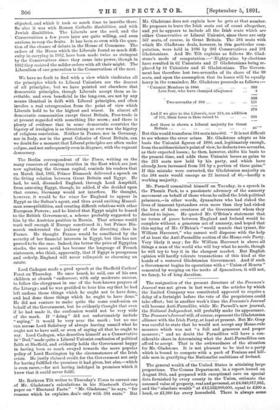Mr. Ruthven Tilt writes to Thursday's Times to correct one
of Mr. Gladstone's calculations in his Nineteenth Century paper on " Electoral Facts." "Mr. Gladstone," he says, " for reasons which he explains, deals only with 584 seats." But Mr. Gladstone does not explain how he gets at that number. He proposes to leave the Irish seats out of count altogether, and yet he appears to include all the Irish seats which are either Conservative or Liberal Unionist, since there are only 567 seats, of course, in Great Britain, The 584 seats with which Mr. Gladstone deals, however, in this particular com- putation, were held in 1886 by 393 Conservatives and 191 Gladstonians. And Mr. Tilt explains as follows Mr. Glad- stone's mode of computation :—" Eighty-nine by-elections have resulted in 62 Unionists and 27 Gladstoniana being re- placed by 44 Unionists and 45 Gladstonians. The Govern- ment has therefore lost two-sevenths of its share of the 89' seats, and upon the assumption that its losses will be equally heavy in the remainder, Mr. Gladstone proceeds as follows :- Unionist Members in 1886 ... 393 Less four, who have changed allegiance
389 Two-sevenths of 389 ...
... 111
278 And if we give to the Liberals, now 213, an addition of 111, their force is thus raised to And there is shown a Liberal majority for Great But this would transform 584 seats into 602. " It is not difficult to see whence the error arises. Mr. Gladstone adopts as his- basis the Unionist figures of 1886, and, legitimately enough,. from the arithmetician's point of view, he deducts two-sevenths, as their expected losses ; he then, however, shifts his basis to the present time, and adds these Unionist losses as gains to- the 213 seats now held by his party, and which have already been increased from 191 by a portion of these gains.' If this mistake were corrected, the Gladstonian majority on. the 584 seats would emerge as 22 instead of 46,—hardly a working majority.


































 Previous page
Previous page